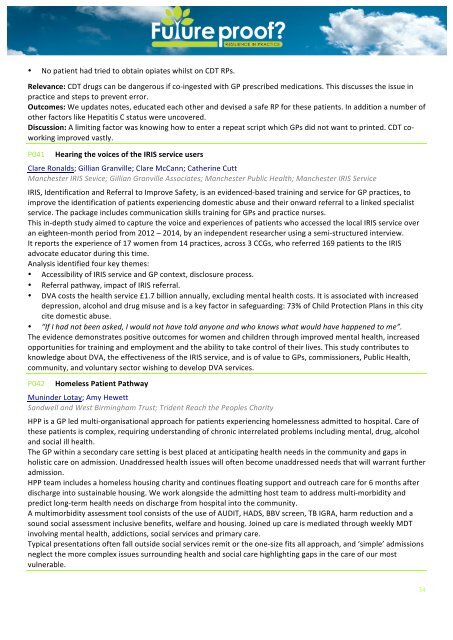RCGP-2014-poster-abstracts
RCGP-2014-poster-abstracts
RCGP-2014-poster-abstracts
Create successful ePaper yourself
Turn your PDF publications into a flip-book with our unique Google optimized e-Paper software.
• No patient had tried to obtain opiates whilst on CDT RPs. <br />
Relevance: CDT drugs can be dangerous if co-‐ingested with GP prescribed medications. This discusses the issue in <br />
practice and steps to prevent error. <br />
Outcomes: We updates notes, educated each other and devised a safe RP for these patients. In addition a number of <br />
other factors like Hepatitis C status were uncovered. <br />
Discussion: A limiting factor was knowing how to enter a repeat script which GPs did not want to printed. CDT co-working<br />
improved vastly. <br />
P041 <br />
Hearing the voices of the IRIS service users <br />
Clare Ronalds; Gillian Granville; Clare McCann; Catherine Cutt <br />
Manchester IRIS Sevice; Gillian Granville Associates; Manchester Public Health; Manchester IRIS Service <br />
IRIS, Identification and Referral to Improve Safety, is an evidenced-‐based training and service for GP practices, to <br />
improve the identification of patients experiencing domestic abuse and their onward referral to a linked specialist <br />
service. The package includes communication skills training for GPs and practice nurses. <br />
This in-‐depth study aimed to capture the voice and experiences of patients who accessed the local IRIS service over <br />
an eighteen-‐month period from 2012 – <strong>2014</strong>, by an independent researcher using a semi-‐structured interview. <br />
It reports the experience of 17 women from 14 practices, across 3 CCGs, who referred 169 patients to the IRIS <br />
advocate educator during this time. <br />
Analysis identified four key themes: <br />
• Accessibility of IRIS service and GP context, disclosure process. <br />
• Referral pathway, impact of IRIS referral. <br />
• DVA costs the health service £1.7 billion annually, excluding mental health costs. It is associated with increased <br />
depression, alcohol and drug misuse and is a key factor in safeguarding: 73% of Child Protection Plans in this city <br />
cite domestic abuse. <br />
• “If I had not been asked, I would not have told anyone and who knows what would have happened to me”. <br />
The evidence demonstrates positive outcomes for women and children through improved mental health, increased <br />
opportunities for training and employment and the ability to take control of their lives. This study contributes to <br />
knowledge about DVA, the effectiveness of the IRIS service, and is of value to GPs, commissioners, Public Health, <br />
community, and voluntary sector wishing to develop DVA services. <br />
P042 <br />
Homeless Patient Pathway <br />
Muninder Lotay; Amy Hewett <br />
Sandwell and West Birmingham Trust; Trident Reach the Peoples Charity <br />
HPP is a GP led multi-‐organisational approach for patients experiencing homelessness admitted to hospital. Care of <br />
these patients is complex, requiring understanding of chronic interrelated problems including mental, drug, alcohol <br />
and social ill health. <br />
The GP within a secondary care setting is best placed at anticipating health needs in the community and gaps in <br />
holistic care on admission. Unaddressed health issues will often become unaddressed needs that will warrant further <br />
admission. <br />
HPP team includes a homeless housing charity and continues floating support and outreach care for 6 months after <br />
discharge into sustainable housing. We work alongside the admitting host team to address multi-‐morbidity and <br />
predict long-‐term health needs on discharge from hospital into the community. <br />
A multimorbidity assessment tool consists of the use of AUDIT, HADS, BBV screen, TB IGRA, harm reduction and a <br />
sound social assessment inclusive benefits, welfare and housing. Joined up care is mediated through weekly MDT <br />
involving mental health, addictions, social services and primary care. <br />
Typical presentations often fall outside social services remit or the one-‐size fits all approach, and ‘simple’ admissions <br />
neglect the more complex issues surrounding health and social care highlighting gaps in the care of our most <br />
vulnerable. <br />
34



